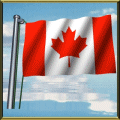
Waiting for visas!
While your visa application is being processed, use this 'waiting time' wisely by working on your English or French language skills. If possible, take classes or work with a tutor to improve your speaking and listening skills.
Have a quick look!
Take an exploratory trip prior to moving (if possible)! This will familiarize you with the environment and may give you an opportunity to meet with some potential employers to drop off your resume ahead of your permanent move.
Choose your moving date wisely!
Moving to Canada in the winter can present a number of problems. Winters in many parts can be very severe with snow for months at a time and temperatures as low as -40 degrees. Arriving during these harsh conditions just adds further stress to you and your family. If you must move during the winter months because of your visas, at least make sure you have pre-arranged accommodation and some reliable transportation available for your arrival.
Pre-Move Planning
Pre-move planning is critical for making your move both successful and enjoyable. Consider the following one month prior to your departure for Canada:
- Sell or get rid of unnecessary belongings.
- Get estimates from shipping companies. Decide on the shipping method to suit your needs, timeframes and budget.
- Get estimates for pet shipping services. An air-worthy animal crate will need to be ordered and is custom built to your pet's specific measurements. Each airline has a different policy on the transportation of live animals. Contact your airline of choice directly for costs/regulations/shipping requirements for your pet.
- Gather up all of the required documentation you will need on landing in Canada and within the first few weeks after your arrival.
Don't bank on it!
Consider leaving your bank account and visa account in your country of origin open for the first few months after you arrive in Canada. Wait until you become established with banking and credit in your new location before closing out these old accounts. As soon as you arrive, visit your local bank manager, introduce yourself, explain your needs and build a relationship from day one.
open a bank account and apply for a credit card.
Arriving in Canada!
Everything will be different and you may be feeling homesick and stressed for the first few months. Most newcomers experience these feelings as they settle into their new life. Realize that these feelings are quite normal and allow yourself to relax and enjoy the differences around you.
Feeling at home in a new country takes time. Be patient! Ask questions! Learn about life in Canada from speaking to people in your neighbourhood, at church or at your children's new schools. This will help you to get involved in your community quicker and you'll settle faster if you have the support of people around you. Canadians are a friendly people and more than willing to help you adapt to your new life!
Culture Shock
It is highly likely you will experience culture shock within your first few weeks or months in Canada. Culture shock results from experiencing a new and different way of life with all its inherent ups and downs. Although culture shock can become overwhelming at times, knowing how to cope can make a big difference. Find out all you can about culture shock and you will be better prepared to cope if you experience those feelings.
Health Insurance
To receive free public health care services in Canada, you must first have a provincial health insurance plan card (Health Card). It is very important to apply for your Health Insurance Card as soon as possible after you arrive in Canada.
Each province administers its own health insurance program so there may be some variations for eligibility from province to province.
In most provinces you will have to pay a monthly fee for this insurance. Provincial health insurance does not cover the cost of prescription drugs, dental care, ambulance services and prescription eye glasses.Do you speak the language?
One of the most important skills you need to adapt more easily to your new life in Canada is the ability to speak English or French. When you arrive in Canada, practice speaking in English or French. Don't be concerned about making mistakes, use every day as a new opportunity to learn and improve your language skills.
No Credit history?
You may wish to purchase goods or services on credit in Canada and as a newcomer you will have no credit history here. Your credit cards from home will provide you with a stop-gap until you receive a new credit card.
It is imperative to build a good credit rating in Canada. Your credit rating is a measure of your credit-worthiness or in other words, your record of borrowing and repayment. Without a credit rating, few institutions will lend you money!
Learn the national anthem!
It's corny but hey!
You can never be too prepared!
Start your research well in advance of your move. Good preparation will save you time and money and a lot of stress in the end! Begin by learning some quick facts about Canada; Weather, Voltage, Public holidays, Canadian money, Tipping, Measurements and the like.
Moving to a new country takes courage. It also offers new and exciting opportunities for you and your family. I hope these tips will give you a snapshot of what to expect and will help you to adapt to your new life.
by Thelma O' Connor



No comments:
Post a Comment